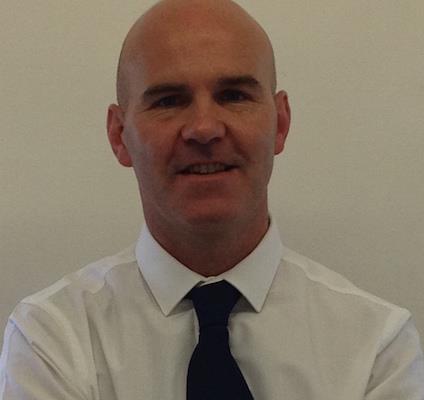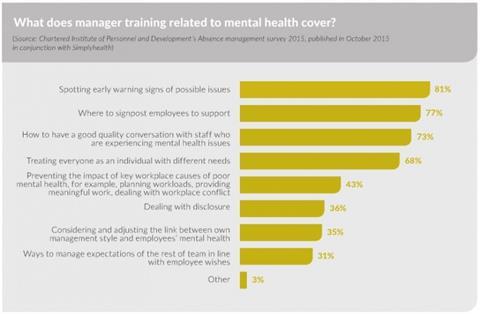
Need to know:
- Managers have an important role to play in addressing mental health in the workplace, but this cannot be the only line of support.
- Making a visible commitment to mental wellbeing can help tackle the stigma surrounding mental ill health.
- Best-practice sharing, collaboration, and drawing on employee feedback can help employers develop a mental wellbeing strategy that is effective for their workforce.
Mental health continues to be a top-priority issue in the workplace, and employers are recognising the commitment they need to make to tackle it. Two-fifths (41%) of respondents to the Chartered Institute of Personnel and Development’s (CIPD) Absence management survey 2015, published in partnership with Simplyhealth in October 2015, report an increase in stress-related absences over the last year. It is difficult to gauge whether this rise can be attributed to employees feeling more able to speak out about stress-related issues, which can be seen as a positive sign, whether it is down to a higher level of incidences of such issues, or, most likely, whether it is a combination of the two.
Yet, with just 39% of employees willing to disclose stress, anxiety or depression as the cause of their absence from work, according to research published by Axa PPP Healthcare in September 2015, there is clearly still a long road ahead when it comes to addressing mental health in the workplace.
Encouragingly, the CIPD survey found that the number of employers providing training to managers to help them support staff coping with mental health issues increased from 23% in 2014 to 30% in 2015. In addition to managing workloads and day-to-day pressures within their teams, line managers are also well positioned to spot early signs of stress and other mental ill-health issues, whether work-related or otherwise. Of course, this is not an easy task, particularly as the manner in which issues manifest themselves can vary between individuals and situations. Training programmes such as mental health first aid courses can equip managers with the skills, knowledge and language to help them more effectively approach mental health issues with their reports and direct them to appropriate support services.
However, line managers will not only require support for their own mental health, but also for the support that they are expected to provide to others. John Binns, former partner at Deloitte and now independent adviser on mental health and wellbeing in business, explains: “Line managers are in an almost impossible situation if [responsibility for mental health is seen as] all down to them but the messaging from the top is not supporting them." He adds that senior leadership on the issue can ensure it remains on an organisation’s agenda.
Creating a supportive and open culture
Boards need to deliver clear messages around how they support employee wellbeing with a particular focus on mental health issues. “It helps if there are mental health champions at a senior level of the business and also particular individuals who people can go to who they know that they can talk to,” says Ben Willmott, head of public policy at the CIPD.
Making a public commitment to addressing mental health in the workplace, for example, by joining networks such as Business in the Community's (BITC) wellbeing at work campaign or the City Mental Health Alliance, or by signing up to the Time to Change pledge, can help to demonstrate to staff that mental health is a priority issue. Such networks and collaborative relationships also provide employers with access to tools and educational resources, as well as offering an opportunity to share best practice and build on the strides that organisations have made thus far.
These measures can also begin to tackle the stigma and myths that often surround mental ill health. Louise Aston, wellbeing campaign director at BITC, notes: “You can’t manage what you can’t talk about, so creating a culture of openness is the starting point.”
Visibly establishing mental wellbeing as a core tenet for an organisation and an integral part of its approach to workplace wellbeing can also serve to breakdown this stigma.
Poppy Jaman, chief executive officer at Mental Health First Aid (MHFA) England, says: “I think the way we’ve got to go is to give mental health the same parity as physical health. So organisations that are building mental health explicitly into their general health and wellbeing strategies are doing a really good job because it means that they are mainstreaming it and they are normalising it.”
Patrick Watt, corporate director at Bupa UK, adds: “I think the key is not seeing [support for mental health] as an HR initiative but actually seeing it as part of being a successful business.”
Of course, there is also a business case for supporting employee wellbeing, which can impact absence levels, presenteeism and the associated costs. “Addressing poor mental health or maximising mental wellbeing is a massive opportunity for business in terms of maximising productivity,” says Aston.
A multi-channel, cross-organisational response
Employers can work with charities, specialists and providers to develop a comprehensive mental wellbeing strategy suited to their organisation. “The best way [to progress with a strategy] is to ask employees so that whatever is built is relevant and is going to work,” notes Corinne Williams, head of human resources at Simplyhealth.
Preventative measures are becoming an increasingly valuable part of approaches to employee wellbeing, with both digital tools and onsite schemes allowing staff to focus on relaxation, mindfulness and resilience techniques, which could be run alongside programmes and activities that foster a positive work-life balance.
Access to services that provide early intervention and recovery assistance to those experiencing mental ill health is an integral element of the support system employers can offer their staff. This might include employee assistance programmes (EAPs), support networks, confidential helplines, cognitive behavioural therapy, and occupational health services, among others. Responsive and flexible working policies can further facilitate support in the workplace for those coping with mental ill health.
Binns says: “Having a range of channels through which [staff] can get help is critical because not everybody sees the issue in the same way and not everybody wants to disclose in the same way.”
However, these services must be effectively communicated to staff if they are to be of use. Building on the traction surrounding calendar events such as National Stress Awareness Day and World Mental Health Day offers opportunities to raise awareness of mental health issues and the support available. While events such as these shine a spotlight on the issue, they should form part of a wider, sustained approach. Bupa’s Watt notes: “This can’t just be a 2015 or 2016 campaign; this has to be something that is embedded within the culture of an organisation to show that it is okay to talk about mental health.”

Viewpoint: Wellbeing plans can help managers make effective changes
Because mental illness affects people in very different ways, there is no one size fits all when it comes to supporting people at work.
As an employer myself overseeing a large team, there are a number of things I have done that anyone could do, which don’t cost anything. It could be something as simple as seating someone with anxiety, for example, in a quieter part of the office. Or it could be a little more flexibility about someone coming in later to avoid rush hour, and then working later.
At Rethink Mental Illness we also have a wellbeing plan that all employees have the chance to fill in, where they can outline ways to keep themselves well, highlight any triggers that may cause their mental health to deteriorate, and suggestions of what to do or who to call if they do become unwell. These are then shared with line managers, who can then make changes as necessary. It’s a simple thing that could easily be included in any induction pack, and if it’s made standard process, it can make it easier to start a conversation.
Training can also be really useful, and Rethink Metal Illness runs courses in things such as addressing negative attitudes to mental health, overcoming barriers to communication, and finding ways to manage difficult conversations. These courses aim to boost employers’ confidence when it comes to mental health, because often people mean well, but just aren’t equipped to deal with issues in the best way.
It’s about reasonable adjustments, but also about creating that open environment where people can talk about their mental health without fear of being judged. We know from the Time to Change anti-stigma campaign, run together with the charity Mind, that talking about mental health is still a problem. So if employers can create an environment where people can talk, that can make a huge difference.
Brian Dow is director of external affairs at Rethink Mental Illness

Herbert Smith Freehills supports mental wellbeing through mentor network
In May 2015, Herbert Smith Freehills launched a mental health mentor programme to support the 2,000 employees at its London office and the 250 members of staff based at its Belfast location. The law firm runs mentoring schemes in other areas of the business, and wanted to draw on this system to normalise conversations around mental health. David Shields, head of diversity and inclusion at Herbert Smith Freehills, explains: “Mentoring is quite relational and we thought bringing that relational aspect into it was a positive for mental health.”
The programme comprises a network of more than 60 volunteers who occupy a range of roles within the firm, from partners and associates to business service professionals. They are also physically located across different parts of the business, so employees seeking to talk confidentially to someone familiar with the pressures and work environment of a particular area are able to do so if they wish.
All of the mentors have taken part in a training course developed in partnership with consultant psychoanalyst Mary Bradbury. This includes training to identify situations where those seeking support would be best served by an alternative channel. “Part of the role of the mentors is to refer people on to the support services that we have in place; for example, they know which GPs have a specialism in mental health and they know how people would access the employee assistance programme,” says Shields.
Herbert Smith Freehills communicated the launch of the programme via an announcement on its intranet site, as well as health and wellbeing booklet desk drops. Staff can find further information about the programme through a dedicated intranet page, which includes profiles, photos and contact information for each of the mentors.
The law firm also runs events featuring high-profile speakers, which are designed to raise awareness and tackle stigma by encouraging discussions around mental ill health.
“[The mentor programme] is part of our wider commitment to diversity and inclusion,” adds Shields. “It’s an important part of creating an inclusive environment where people can be open.”












